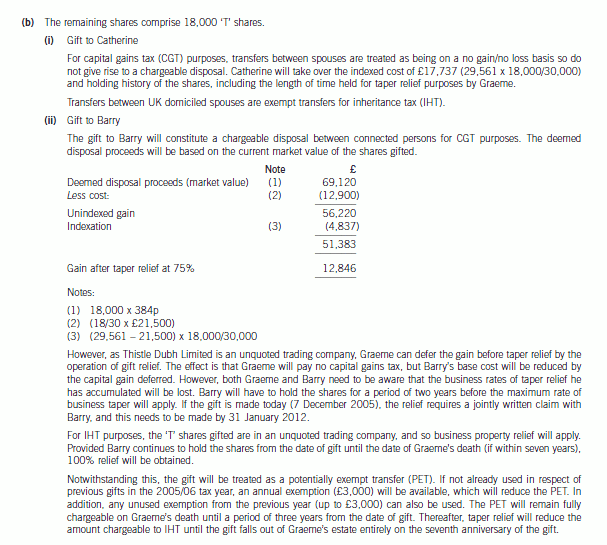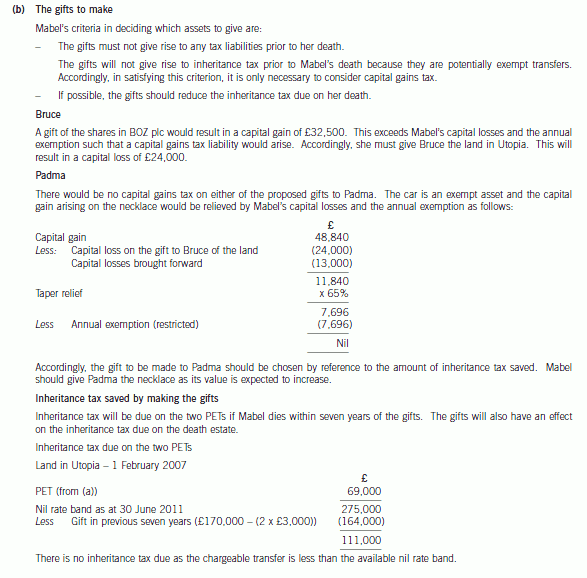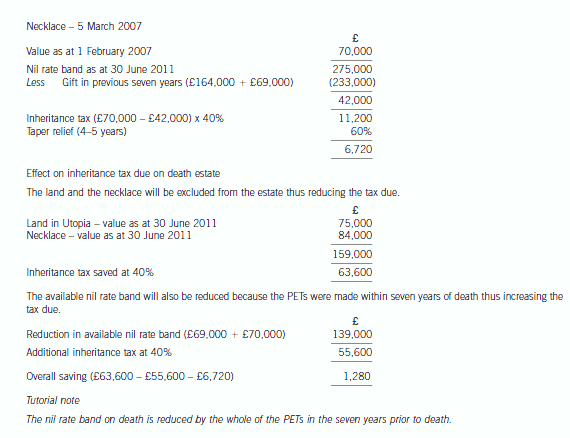(ii) Explain why Galileo is able to pay the inheritance tax due in instalments, state when the instalments are
due and identify any further issues relevant to Galileo relating to the payments. (3 marks)
第1题:
(c) Assuming that Stuart:
(i) purchased 201,000 shares in Omega plc on 3 December 2005; and
(ii) dies on 20 December 2007,
calculate the potential inheritance tax (IHT) liability which would arise if Rebecca were to die on 1 March
2008, and no further tax planning measures were taken.
Assume that all asset values remain unchanged and that the current rates of inheritance tax continue to
apply. (6 marks)

第2题:
(b) Explain the capital gains tax (CGT) and inheritance tax (IHT) implications of Graeme gifting his remaining ‘T’
ordinary shares at their current value either:
(i) to his wife, Catherine; or
(ii) to his son, Barry.
Your answer should be supported by relevant calculations and clearly identify the availability and effect of
any reliefs (other than the CGT annual exemption) that might be used to reduce or defer any tax liabilities
arising. (9 marks)

第3题:
(c) (i) State the date by which Thai Curry Ltd’s self-assessment corporation tax return for the year ended
30 September 2005 should be submitted, and advise the company of the penalties that will be due if
the return is not submitted until 31 May 2007. (3 marks)
(ii) State the date by which Thai Curry Ltd’s corporation tax liability for the year ended 30 September 2005
should be paid, and advise the company of the interest that will be due if the liability is not paid until
31 May 2007. (3 marks)
(c) Self-assessment tax return
(1) Thai Curry Ltd’s self-assessment corporation tax return for the year ended 30 September 2005 must be submitted by
30 September 2006.
(2) If the company does not submit its self-assessment tax return until 31 May 2007, then there will be an automatic fixed
penalty of £200 since the return is more than three months late.
(3) There will also be an additional corporation tax related penalty of £4,415 (44,150 × 10%) being 10% of the tax unpaid,
since the self-assessment tax return is more than six months late.
Corporation tax liability
(1) Thai Curry Ltd’s corporation tax liability for the year ended 30 September 2005 must be paid by 1 July 2006.
(2) If the company does not pay its corporation tax until 31 May 2007, then interest of £3,035 (44,150 at 7·5% = 3,311
× 11/12) will be charged by HM Revenue & Customs for the period 1 July 2006 to 31 May 2007.
第4题:
(b) Mabel has two objectives when making the gifts to Bruce and Padma:
(1) To pay no tax on any gift in her lifetime; and
(2) To reduce the eventual liability to inheritance tax on her death.
Advise Mabel which item to gift to Bruce and to Padma in order to satisfy her objectives. Give reasons for
your advice.
Your advice should include a computation of the inheritance tax saved as a result of the two gifts, on the
assumption that Mabel dies on 30 June 2011. (10 marks)


第5题:
(ii) State when the inheritance tax (IHT) calculated in (i) would be payable and by whom. (2 marks)
第6题:
(d) Advise on any lifetime inheritance tax (IHT) planning that could be undertaken in respect of both Stuart and
Rebecca to help reduce the potential inheritance tax (IHT) liability calculated in (c) above. (7 marks)
Relevant retail price index figures are:
May 1994 144·7
April 1998 162·6
第7题:
(ii) State, giving reasons, the tax reliefs in relation to inheritance tax (IHT) and capital gains tax (CGT) which
would be available to Alasdair if he acquires the warehouse and leases it to Gallus & Co, rather than to
an unconnected tenant. (4 marks)
第8题:
(ii) Recommend which of the refrigeration systems should be purchased. You should state your reasons
which must be supported by relevant calculations. (3 marks)

第9题:
(ii) Explain the income tax (IT), national insurance (NIC) and capital gains tax (CGT) implications arising on
the grant to and exercise by an employee of an option to buy shares in an unapproved share option
scheme and on the subsequent sale of these shares. State clearly how these would apply in Henry’s
case. (8 marks)
第10题:
(c) Without changing the advice you have given in (b), or varying the terms of Luke’s will, explain how Mabel
could further reduce her eventual inheritance tax liability and quantify the tax saving that could be made.
(3 marks)
The increase in the retail prices index from April 1984 to April 1998 is 84%.
You should assume that the rates and allowances for the tax year 2005/06 will continue to apply for the
foreseeable future.